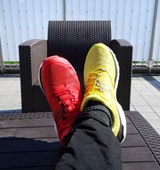At 18 years old, I started college at the University of Nebraska-Lincoln as a music performance major, set on leaving with a degree in percussion. I wasn’t entirely sure what I was going to do with that degree, but what I did know was that—in spite of doing very well in school in a range of subjects—what I loved doing the most was performing and writing music.
My parents, teachers, counselors, and friends all said, “Follow your passion”... So I did.
Fortunately, by the beginning of my sophomore year, I started to develop a real career plan. But at that point, the balance of my interests shifted. I’d grown far more fascinated with composing, and performing as a drummer & percussionist took a secondary role. I loved (and still love) the idea that as a composer I could tell a story with nothing but sound. In many ways, music is the most abstract artistic medium, and yet it can also be the most visceral and emotionally specific. Combining that idea with my pre-existing love of cinema, led me to pursue a career in film & commercial music.
But… Where to begin?
Lincoln, Nebraska, is hardly a mecca for the film industry. No one in my family nor anyone else I knew had any connections or experience that would have helped me get started scoring films. Even my professors at UNL couldn’t help me, as their experiences were mostly in contemporary classical and jazz. At best, my composition professor might have helped me get a gig writing for the circus, and he did hire me to perform in pit orchestras and stage bands around town.
I had a great time doing that kind of work, but it wasn’t my dream.
Without any obvious “in” to the film industry, I decided that my best option would be to just start learning as much as I could about filmmaking. I was a sponge. I started trying to learn video editing and looked around for a day job that could help me get where I wanted to go faster. There aren’t a ton of companies that do that kind of work in Lincoln, but I did recall one business that used to film my high school band concerts and football games: Shramek’s Video.
I’ll be honest… They weren’t exactly Paramount.
At the time, Shramek’s was (and I guess, still is) a tiny shop that recorded weddings and live events, and produced a public-access cable show about NASCAR. But the core of their business was mostly VHS and DVD duplication and converting old 8mm reel-to-reel tapes to more modern digital formats. But it was the only place I knew where I could maybe learn filmmaking basics and get a start on developing the skills I needed for the career I actually wanted to have.
So one day, I walked into the business off the street and asked if they were hiring.
They weren’t.
But I was persistent. I asked if I could speak with the owner. Fortunately, he was available and open to seeing me, so I went upstairs to his office and pleaded my case. I said that I wanted to learn everything I could about video production and that I was willing to do any job he needed to do. I’d happily take out the trash and clean up the storefront, I would schlep camera gear and lug boxes of VHS tapes and DVDs up and down the stairs. I just wanted a job where I could work with people who knew how to shoot and edit video.
He said no. There were no jobs available.
I went for the hail mary. I said, “How about this, I’ll come in on Monday and work for you for a whole day for free.”
The owner’s demeanor changed… I continued.
“Don’t pay me anything for the first day, and just let me hang around doing whatever you need me to do. If I prove myself to be valuable, keep me on and just pay me $6 an hour.”
This turned him around. He agreed to have me come in on Monday, and I worked as hard as I could to demonstrate to him that I was going to be worth hiring. After that day, he gave me a part-time job and I worked for Shramek’s for the better part of a year while I was in college.
Most of my job was setting up duplications and transfers, and I spent many hours in a dark room stringing 50-year old 8mm film around projector spools so that I could convert people’s old home movies to DVD. It took a few months before I was allowed to start working with their editor to learn Final Cut Pro 4. When I did, I soaked up as much as I could, learning how important it was to carefully label and track footage, how to work around the limitations of the technology, how to set up projects, and how to make basic cuts and work inside a timeline.
None of this was glamorous. I wasn’t doing exciting work on prestigious projects, I wasn’t paid well or even treated particularly well (for a few reasons, the environment at the company could be fairly toxic), and I didn’t have much ownership over anything I did.
But I was learning, and that’s all that mattered to me.
After I left that company, I used my skills to get a better job at a New Media Center at my university. A couple years later, I went off to graduate school in New York City pursuing a Masters degree in Film Scoring at NYU, bringing my improved understanding of the filmmaking process with me.
And today, I use the skills I started developing way back then every day in my role as Director of Media for FEE.
My advice to people just starting out is this: Don’t be afraid to take a risk and put yourself in a position to learn something you don’t know how to do, even if the job you’re doing doesn’t seem like what you really want. Everybody has to start somewhere, and very few of us are blessed with connections and money or get handed the career of our dreams. But you can always build your dream career yourself if you are willing to put in the work.


